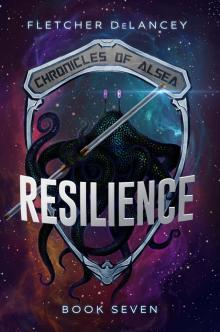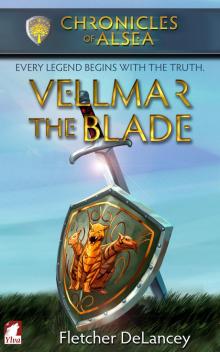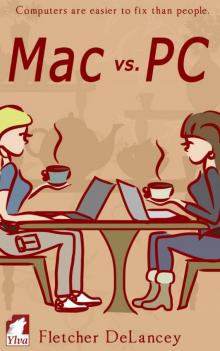- Home
- Fletcher DeLancey
Outcaste: Book Six in the Chronicles of Alsea Page 7
Outcaste: Book Six in the Chronicles of Alsea Read online
Page 7
Every time they met, Rahel reveled in her mother’s pleasure at seeing her and the love she felt in their warmrons. She treasured their days together. But there was always an emotional crash afterward, when the strain of deceit caught up with her. Why couldn’t she have parents who loved her for who she was, rather than the picture she painted for them?
If her parents had taught her about conditional love, Mouse taught her the opposite. He accepted her and appreciated what she had to offer. He made her feel strong and useful. He helped her write the updates to her father, turning what should have been a stressful chore into something they could laugh about. Living with him was easy and fun.
One day in the middle of summer, when Jacon’s food cart was closed for the afternoon, he and Mouse took her down to Dock One and taught her how to swim. Jacon was big and strong enough to support her in the water, while Mouse floated beside them and demonstrated techniques. In the protected space reserved for the use of city residents, she splashed and shouted and laughed like a child, swallowing more water than was good for her and having the time of her life. Once she crossed that magical line and could stay afloat without help, she swam herself into exhaustion. After that, she pestered her friends at every opportunity for a run down to Dock One. They swam as often as they could until the water grew too cold.
The crisp nights and clear days of autumn bathed Whitesun in a different kind of light, one that made all of its colors seem brighter. In the summer, sea mists had often obscured the horizon, but now the line between sea and sky was drawn as if by the slash of a sword. Even the air felt different in her lungs.
She fell in love with the city then. It was her home, a home she had chosen, and sometimes it felt as if Whitesun had chosen her in turn. She purchased clothing and boots better suited to the oncoming weather and thanked Fahla that she was not still working the docks—or sleeping illegally on a stack of crates.
When the calm brilliance of autumn gave way to the tempests of winter, Rahel learned how Wildwind Bay got its name. The first time she heard the screaming of wind through the ships’ cables, she envisioned an enormous winged monster wheeling above the thick, dark clouds, striking fear into all below. The gentle bay in which she had learned to swim became a raging mass of white water and foam, crashing against the seawall like a caged beast howling at its captivity. Shipping traffic came to a standstill, the walkways were empty, and when the rain arrived, the wind blew it sideways. There were times when she stood at their window and could not see across the street.
That first storm blew itself out after three days of fury, leaving behind a sky so blue that her eyes ached with the beauty of it. Shopkeepers washed salt water from their windows, residents crowded the still-wet walkways, and the fishing boats ran en masse to the sea, their crews eager to make up for the enforced days at anchor.
For Rahel, the most surprising thing was that the bay itself didn’t seem to know the storm was over. It raged and crashed for another day, though the waves were far less chaotic. On her next trip to the library, she mentioned her observation to Deme Isanelle and learned about the difference between wind waves and oceanic swells.
She went home with a book on ocean currents and wave physics, and spent the next nineday absorbing fascinating details about the world that Whitesun’s boats navigated. Her old dreams of exploration flared to the surface, now accompanied by considerably more knowledge and memories of the storm.
More storms came and went, each of them firing her blood. Mouse rolled his eyes when she insisted on going outside to experience the howling wind and horizontal rain firsthand. By the end of winter, she wondered how people lived anywhere else. It could only be ignorance, she concluded, because if they knew the welcoming water of summer, the crisp beauty of autumn, and the glories of these wild storms, they would come.
Spring brought more of those aching, sparkling blue skies and a marked increase in temperatures, as well as more rain than she ever imagined could fall in one place. The weather changed with dizzying speed, and a rain cloak was required no matter how nice it looked when she walked out the door. That was a lesson she learned the hard way, though it was almost worth it for the way Mouse shouted with laughter upon seeing her bedraggled form return.
The night of her sixteenth birth anniversary, Jacon appeared at their door with a basket full of mouthwatering foods and a bottle of what he called summer cider. It was sharp and fizzy and tasted like a cross between cinnoralis and pica sauce. Jacon laughed at Rahel’s description and said she was close; the pica sauce flavor came from fermented panfruits.
She had not expected gifts, but Jacon gave her a card worth twenty salterins at his food cart, and Mouse gave her a stave.
The breath caught in her throat when she unwrapped the stave. “Oh, Mouse. This is—”
She stopped before she could insult him by referring to how much it must have cost. This exquisitely worked metal was a true warrior’s weapon, not at all like the wooden ones she had been training with.
Holding the short grip in one hand, she rose from the couch and stood in the middle of the room, making sure Mouse and Jacon were out of range. Then she pressed the hidden release.
Faster than she could see, the two ends of the stave shot out from the central grip, assembling themselves into a seamless whole longer than she was tall. She wanted to twirl it a few times and put it through its paces, but the room was too small.
A second press of her fingertips sent the stave segments retracting into the grip so rapidly that the force of their impact kicked up her hand. She turned her wrist and opened her fingers, admiring the designs etched into the grip as an enormous grin spread over her face.
“I can’t wait to take this to Moonbird tomorrow! Hasil’s been telling me about the differences between handling a training stave and a real one. Now I can find out for myself. It’s beautiful. Mouse, thank you!”
She set the grip on the bookshelf and scrambled over to the couch, where she startled Mouse by raising both of her palms. Fahla only knew the last time anyone had offered him this familial gesture, but he had been her family for some time now. She wanted him to know.
“You’re welcome,” he said, trying valiantly to hide the water in his eyes. The emotion came through his touch, and she smiled as she interlaced their fingers.
“Hoi, Mouse, now I feel cheap,” Jacon said with a laugh. “I just gave her a few salterins.”
“You gave me your labor and your craft.” Rahel straightened and turned her smile on him. “That’s not cheap. I never expected anything, but you’ve both made this the best birth anniversary I’ve ever had.”
They topped off their celebration by walking down to the end of Dock One, where they sat in a row at the very end of the pier, their legs dangling over the water. Jacon had brought the bottle of summer cider, and they traded it back and forth while the moons rose one by one over the cliffs edging the east side of Wildwind Bay.
Rahel bumped her shoulder into Mouse and said, “Sure is different from last cycle.”
He didn’t turn his head, but she could see his smile in the moonlight. “For me, too.”
As wonderful as her birth anniversary was, it brought with it a sense of impending doom. The timer was ticking down on her temporary work permit, and at the end of its cycle-long term, Hasil would be required to submit a report on her work to the merchant caste house. The caste house would send it on to her father, and he would know that she was working for a warrior. She had told her mother that she was managing a recreation club, and in all of her written updates, she had skirted the issue with a great deal of creative help from Mouse. But there would be no skirting the official report.
“You were still working as a merchant,” Mouse said. “Maybe he’ll be happy with that and renew your permit.”
“You don’t know my father.” There was not a doubt in her mind that he would be angry. Worse, his pride would be injured. Rahel had dealt with enough bullies over the past cycle to have realized that her fathe
r shared a few things in common with them, at least when it came to her.
A bully whose pride was injured invariably attacked.
11
DEFENSE
Mouse was not one to let a foreseeable doom arrive unimpeded.
“What do you do when you know some musclehead is going to come at you?” he asked a moon after her birth anniversary.
“Depends on the situation,” Rahel said. “Is he skilled? A dumb fighter? Is there more than one? Is my back to the wall, or do I have room to move?”
“Warriors. You always have to make everything so complicated. I mean, do you just stand there and let him hit you, or are you going to defend yourself?”
“What a stupid question—”
“Fahla! Rahel, your father is going to come at you in another moon. Are you going to just stand here?”
She frowned at him. “What else can I do?”
“You can defend yourself. Get ready. Prepare.”
“How?”
“This, for one.” He indicated their apartment. “It’s in your name, backed by your father’s name on that permit. We’ve been perfect renters for almost a cycle. Don’t you think it’s worth a try to see if we can sign on for another cycle? Before your permit expires?”
“I didn’t know that was possible.”
“It might not be, but you won’t know if you don’t try.”
She had been dreading the idea of moving back to a toilet hole like the last one. If they could hold on to these rooms for another cycle . . .
“I’ll ask tomorrow,” she said.
When she spoke with the building owner, carefully implying how pleased her father was with the rooms, he was delighted to not have to search for new tenants. Not even a quarter hantick later, she triumphantly carried her new contract upstairs. The relief coming off Mouse nearly matched her own.
Two days later, she told Hasil that she did not expect her father to renew her work permit.
“I find that difficult to believe, given the nature of the report I’ll be preparing,” Hasil said. “Your work has been exemplary. I was hoping to keep you for another cycle, maybe two.”
“I wish I could stay.” She cleared her throat, trying to prevent her voice from breaking, but he held a higher empathic rating and looked at her with sympathy.
“Your father does not approve.”
“No. He’s not . . . fond of warriors. I told him I was working for a recreation club.”
“Ah.” Hasil gazed across the training room, his mouth pressed into a thin line. “For the first time, I wish my house did not have the words training house in its name. There will be no hiding where you spent your cycle.”
“No. But . . . can I still see you after your classes? If I have questions?”
He turned to her with a spark in his eye. “I am always available to answer your questions. You’re welcome here whenever the door is unlocked.”
“Thank you,” she whispered, dropping her head. “I, um, I have to go refill the cinnoralis burner.” She fled to the centering room and let her tears fall.
The threat of losing this place—and Hasil’s wisdom along with it—had been far worse than the thought of losing their home. Now, she stood in the room that had brought her such peace and smiled through her tears. Mouse was right. She didn’t know what was possible until she tried.
Deme Isanelle was the most difficult to prepare for. Rahel kept delaying as she considered the possibility that if she said nothing, the library records might not be updated for some time. She could continue to have access for moons, maybe even another cycle. But if she spoke up, a check of her record was guaranteed. She couldn’t see the austere Head Librarian casually breaking the law.
In the end, her respect for Deme Isanelle won out. She could not repay her mentor’s time and kindness with a lie, even if it was just a lie of omission. The day before her permit expired, she went to Deme Isanelle’s office and tapped on her open door.
“Rahel.” Deme Isanelle put down her reader card and gestured at her guest chair. “What can I do for you?”
Rahel sat and looked around the office, with its piles of books on every horizontal surface and the colorful textiles collection covering the walls. She had spent many happy hanticks here, but that was unlikely to continue.
“I came to say good-bye,” she said. “My temporary work permit expires tomorrow, and after that I’ll have to go back to the docks. I won’t be able to come here during the day, so I don’t think I’ll see you again.”
Deme Isanelle let out a long exhale. “Finally. I confess you did have me concerned.”
“What?”
“You waited until the last day. I was beginning to fear you would try to cheat. I’m very glad to see that you’ve acted with the honor I expect of a warrior.”
She needed a moment to find her tongue. “You knew all this time?”
“I remember a girl barely a day over fifteen walking in this office with the weight of the whole world on her shoulders, asking me if I knew where people who had no shelter could sleep.” Deme Isanelle rested her forearms on her desk and crossed her hands. “You made an impression on me then. Two moons later, I began seeing you coming and going several times per nineday, always with books in your arms. Something had clearly changed. I found out your name and checked your record. How do you think I chose those books for you the first time?”
Rahel had never given it a thought. She had simply accepted that Deme Isanelle knew about her book choices because that was what librarians did. “I’m a grainbird,” she muttered.
“A little.” Deme Isanelle smiled. “But you’re also honest and honorable. And I find no honor in denying a vibrant mind the chance to grow because of an expired permit.”
Her heart leaped. “You mean . . .”
“I will not rescind your right to take books from this library.”
“But . . . the law?”
She had rarely heard Deme Isanelle laugh. “Oh, child. It’s not a law. It’s a library rule, and I’m the Head Librarian. I decide which rules are enforced. Do you know why that rule exists?”
Why would a caste affiliation be required to take library books home?
So the library could track down anyone who didn’t bring a book back, she realized. The caste house could apply pressure on the offender, and if that didn’t work, they would probably issue a fine for the replacement cost. Caste houses were ruthlessly efficient at extracting fines.
“To make certain you don’t lose books,” she said.
“Exactly. How many times have you not returned a book?”
She began to smile. “Never.”
“You’ve never even been late. In fact, you usually return books half a nineday early, because you devour them so quickly and then you’re off to the next set. I’m breaking a rule for you because you’ve demonstrated to me that the rule is not necessary in your case. And because you acted with honor in telling me about your permit.”
“What would you have done if I hadn’t told you?”
“I hadn’t decided yet. But I do know one thing: I would have been very disappointed in you.”
Rahel could not meet her eyes. “I thought about it,” she confessed.
“I know you did.” Deme Isanelle’s voice was soft. “The temptation must have been very strong. But we don’t judge people by their thoughts, Rahel. We judge them by their actions.”
She didn’t have to give up her books. She would never have to give up her books. After living under deadline for so long, always watching the approaching end of everything she cared about, this sudden freedom was too much. To her horror, she burst into tears.
“Sorry,” she gasped, and buried her face in her hands.
She heard Deme Isanelle walk past her and close the office door. The second guest chair creaked with the weight of a body settling in it.
When a warm hand touched her shoulder, she started upright. Deme Isanelle was not the sort of person who did that, but here she was, smiling s
adly and offering a kerchief.
“There’s no shame in weeping,” she said. “Sometimes we really do carry the weight of the world.”
Rahel accepted the kerchief and held it against her eyes as a fresh wave of tears flowed. “He’ll take it all,” she cried. “He always does. I’ve saved what I can, but I’ll lose my job and I don’t know if I can handle the dock work again. It’s awful, Deme Isanelle. It’s so hard and I’ll never have time for anything else. I won’t see you anymore and I . . . I loved these times . . .” Her throat closed off and she gave up trying to speak.
“I did, too.” Deme Isanelle rubbed Rahel’s back in a slow, gentle motion. “Your mind is a lovely thing, Rahel. Promise me you won’t let it go. You must keep trying.”
“I . . . I will. But it won’t be the same.”
“No, but it doesn’t have to end. It just so happens that I work a late shift on Firstdays. I would be very glad if you stopped by after your work.”
“You do? You would?” She wiped her eyes and tried to get her breathing under control.
“I would. Can I depend on seeing you this Firstday?”
“Yes,” she said fervently. “I’ll be here.”
The next day, Rahel took Mouse to the merchant caste house for support while she checked her permit status.
“I’m sorry,” the clerk said. “Your permit has not been renewed. I do have a message for you.” He turned a reader card around and slid it across the desk. “Press your thumb here, please.”
The reader card accepted her thumbprint and released the message. It was from her father, and was just as short as she expected.
The only merchant job I will help you with is the one in our shop. It’s time for you to come home.
“Can I respond to this?” she asked.
“Yes, of course. Just press there.”
She tapped where he pointed and wrote out her answer. Then she thanked the clerk and led Mouse back across the lobby.

 Alsea Rising: The Seventh Star (Chronicles of Alsea Book 10)
Alsea Rising: The Seventh Star (Chronicles of Alsea Book 10) Far Enough
Far Enough The Caphenon
The Caphenon Catalyst
Catalyst Resilience
Resilience Outcaste
Outcaste Without a Front: The Warrior's Challenge (Chronicles of Alsea Book 3)
Without a Front: The Warrior's Challenge (Chronicles of Alsea Book 3) Outcaste: Book Six in the Chronicles of Alsea
Outcaste: Book Six in the Chronicles of Alsea Without a Front
Without a Front Do You Feel What I Feel. a Holiday Anthology
Do You Feel What I Feel. a Holiday Anthology Vellmar the Blade
Vellmar the Blade Mac vs. PC
Mac vs. PC